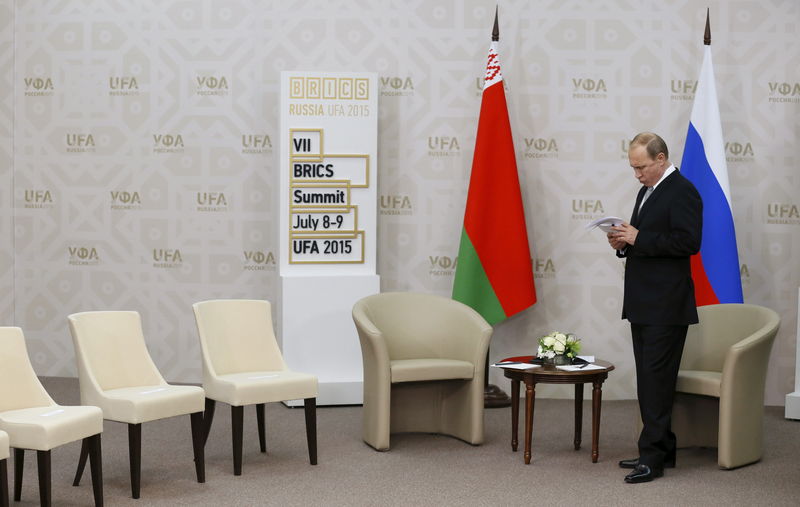By Darya Korsunskaya, Denis Pinchuk and Lidia Kelly
UFA, Russia (Reuters) - Russian President Vladimir Putin and his government courted Beijing on Wednesday before a BRICS summit, playing down a stock market plunge in China and proposing better terms for investors from Beijing.
Meeting Chinese President Xi Jinping in the Russian city of Ufa, Putin, whose country needs investment to pull out of a downturn worsened by Western economic sanctions over the Ukraine crisis, called for solidarity and unity in bilateral ties.
"We are clearly aware of the difficulties we face, in both the economy and international politics," Putin told Xi on the eve of the meeting of leaders from the emerging economies of Brazil, Russia, India, China and South Africa.
"But by combining our efforts, we will surely overcome all challenges before us. We will solve all the problems and tasks."
China has been trying for more than a week to prevent the stock market from tumbling and on Tuesday unveiled yet another set of measures intended to stop the sell-off.
Russian officials played down the slump's impact. Economy Minister Alexei Ulyukayev said he was confident Beijing could stabilise the situation and Finance Minister Anton Siluanov said it held only small risks for Russia.
"The impact on Russia's finances, capital flows, and the balance of payments from the changes in the Chinese financial market, has been minimal," he said.
Details of Wednesday's talks were not disclosed but Russian officials present included the energy and finance ministers.
Putin also had talks with South African President Jacob Zuma and Indian Prime Minister Narendra Modi before Thursday's summit, at which the leaders are expected to put the last touches to a $100-billion contingency currency reserves pool and launch a BRICS development bank.
The BRICS account for a fifth of the world's economic output and 40 percent of its population. The pool and New Development Bank, with an initial $50 billion in capital, are central to their efforts to reshape the Western-dominated financial system.
The summit, and a regional security meeting on Friday, offer Russia a chance to show it is not isolated globally.
LOOKING TO ASIA
After annexing the Crimea peninsula from Ukraine last year and facing sanctions that cut Moscow off from most Western financial markets, Putin sped up a geopolitical and economic shift towards Asian markets, and China in particular.
Russia's economy, battered by the punitive measures from the West and a fall in global oil prices, has been struggling to attract investment and is sliding towards recession, with gross domestic product expected to decline by more than 3 percent.
A $400-billion gas supply deal signed last year accelerated Russia's eastward expansion though ties have not developed in all areas as quickly as Moscow hoped.
China is Russia's second-largest partner after the European Union, accounting for over a tenth of Russia's overall trade last year, but Russia's share in China's foreign trade was only 2.2 percent, Russian official statistics show.
Both want to more than double trade turnover by 2020 and switch increasingly to local currencies in trading settlements.
The Russian Finance Ministry has estimated that "at some point" half the trade between Russia and China could be carried out in yuan and roubles as long as China removes currency restrictions on Russian banks.
Siluanov said both sides were working on easing the terms of investment and his ministry wanted to remove restrictions on Chinese investors in Russian financial markets: Chinese funds can invest in Russian stocks but Chinese banks cannot.

"We are talking about a gradual lifting of restrictions for Chinese financial institutions investing in (Russian) financial markets," Siluanov said. "This would substantially increase the size of capital flows between our two countries."